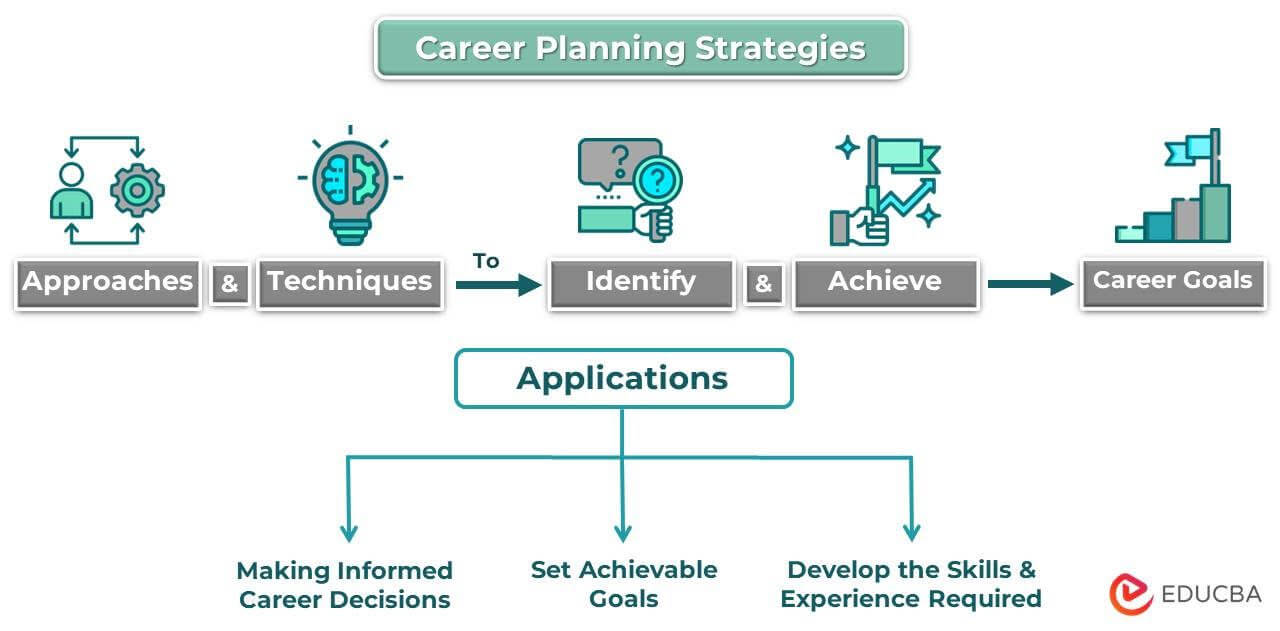 All About The Career Planning Strategies
All About The Career Planning Strategies
Career planning strategies refer to the various approaches and techniques individuals use to identify and achieve their career goals. These strategies are intended to help people in making informed career decisions, set achievable goals, and develop the skills and experience required to succeed in their chosen field.
However, these strategies are under-emphasized in the world of success. People feel it’s useless to plan for a career because the economy is volatile, and individuals need more control over their careers. But if you know how to plan rightly, you will understand that it’s foolish not to go through career planning.
Importance of Career Planning Strategies
Before going into what steps would be helpful to plan your career successfully, let’s look at a few reasons why it is of utmost importance.
- Career planning puts you in the driver’s seat. Instead of letting your company or the boss control your future career prospects, you decide what you want to do with your career.
- Career planning helps you get out of your default mode of who you can be and puts the career planning tools in your hands to say – Here is everything you need. Go, make yourself count.
- Career planning strategies help you ensure risk management and let you see the obstacles in your career.
- Career planning also lets you learn what you can be if you know who you are and how to grow.
- It’s a tool that makes you the man/woman you would like to be (by helping you set goals) and not someone by the whims of your company/boss.
- Finally, career planning is a master plan for your entire career. It’s a map for you to decide at which point you should move to a different destination.
If you are not convinced, you need to try the steps. While going through the steps, you will see how transformative this exercise is. If you’re curious, take a pad and pen and do the exercises as you travel with the article. It would help you have a master plan to guide your future career.
Steps To Career Planning Strategies
1. Self-assessment
The whole of life is a trade-off. If you have yet to hear about the concept of opportunity cost, here it is. If you invest today in reading a book, you can’t go out with your friends for a movie. Meaning you can choose one of two or more options. If you want to have the cake and, at the same time, eat it too, then it needs to be clarified. Thus, it’s prudence to know what you can be, not all you can be. It’s a self-assessment strategy to see what career planning suits your skills, interests, inclinations, and passions.
The career planning strategies advise that you can freely choose your career. You need to know your options and what your interest is. The best way to find that out is to list your skills. Make a list of everything. Then take a different sheet of paper and write down everything you’re interested in doing. Now, look at both lists. Select the common terms and make a third list which we will call – “the possibility list,” and we will begin to work on them from there. This list-making exercise is straightforward and helps you clarify your desire to be something in your career planning strategies.
One loophole of this method is that if you want to be something and the skills required for it doesn’t match your current skills. Simple! Opt for some self-development skills. Thus, you should have three lists handy after making a list. Remember, these 3 lists are equally important.
2. Prioritize and Choose
Everything that you have on the list cannot start simultaneously. Which should you pick first? The best option is to ask yourself what you want to be. The best question to ask yourself is if you had all the resources, finances, and people available, what would you like to be in your life? If you ask yourself this question and ponder on it sometimes, you will get a definite answer. The lists you’ve made will help you choose your ultimate career goal.
Most people don’t achieve their full potential because they try to climb the wrong walls all through their career planning and development, and at the end of the day, they ask themselves – What if my whole career planning strategies have been wrong? What if it’s too late? Don’t let yourself make that mistake. You have the opportunity to choose right now. You don’t need to listen to other people, and you don’t need to think about what’s possible and what’s impossible. Instead, concentrate on what you want to be with all your heart.
If you spend enough time on the above question (in bold), you will get an answer. Please don’t ignore it. Follow through.
3. Current vs. Future Goals
Most people need help with the career planning strategies they should choose. The dilemma revolves around their current career goals and their future ambition. They think twice before moving on if their career planning and development seem very lucrative regarding money, position, impact, and the job of their dreams. But your future is not like your present. You need to uplift yourself. You need to grow. And you need to listen to your heart which aches to become what you’re capable of becoming.
Your current career planning and development is just a tiny portion of what you can be. Everyone can be a genius. But we let go of the best because we’re satisfied with the good. Yes, there’s a risk. You need to take chances. You need to be unreasonable. People will call you names. But remember, life is short, much shorter than you and I can think. Not living up to our full potential wastes our incredible talents, qualities, and skills. To put the risk out of the picture, begin as a part-time adventurer.
Keep the job as well. It may seem overworked and a little more time on the desk. But eventually, it will pay off, and you will understand the magic of your career planning and development.
4. Career Research
The dream looks bright in the eyes of the beholder. But is it practical? What if it is an illusion? You need a reality check. You need to go to the market and search for yourself whether what you think is correct or not. For example, the training business’s market is not as beautiful as it seems.
There are a lot of trainers in the market and very few demands in the industry. Result? People who dream of being trainers are stagnant in their minds. But that doesn’t mean you can’t be a trainer if you want to be. Along with checking the reality of the training business, you must prepare yourself to be exceptional.
The average has no place in the market. The position is only for the best of the best. If you are not the best, why will people choose you? Who would you go for if you have an ear issue? The best ENT specialist in town! Why? Because only the best are in demand. If you want to make your mark, know the reality, but at the same time develop yourself to be world-class.
5. Create an Action Plan
Image source: pixabay.com
Ideation without action is a delusion. If you plan to act upon and know what you want to be soon, you need more. You must create an action plan immediately so everything can be printed on paper. Write out every minor step in detail. By doing this Utilizing daily planner templates can streamline this process, allowing you to organize your thoughts and actions efficiently.
The whole work is the art of chunking down. When you take a big task and slice it into the tiniest parts to make it easy, it’s called chunking down. Same here! To be something beyond your comfort zone, in the beginning, it seems overwhelming. But once you write down each step that will get you to your destination, the path will become easier. Are you writing it down? If not, start right away.
6. Set a Deadline
After writing all the action steps that will make you reach your mountain top, you only need to set a deadline for each task. Why do that? A deadline is an assumed threshold before you would like to take the step identified. A famous expert mentioned that – there are no unrealistic goals, only unrealistic deadlines.
So, while setting deadlines, think twice. What takes only one month may take more than a quarter, or what seems to get finished within a year may get done within six months. It’s always better to create a buffer time before setting any deadline. Buffer time is a time used just in case things go wrong.
Keep the buffer time 20% of the time you decide to accomplish a task. For example, if you initially set a time for “market research” as three months (90 days), adding a buffer time of 20% means another 18 days. So, you should set the deadline for accomplishing the “market research” task within 108 days. Do the same with every other job. It may take some time. But in the end, it’s worth it.
7. Meet a Consultant
Pay heed if you’re wondering where you would find the consultant. You need to find someone who already has treaded along the path you’re about to cross over to reach your summit. You will know what you want to become once you’ve done all the exercises. It may take a lot of work to find them right away. Keep looking.
But it’s said that we’re only six people away from our destination. It’s a law. It’s called “six degrees of separation.” If you want to search for that person, ask as many people as possible. Eventually, you will get to know the person, and it’s up to you to convince them to consider your career planning. If they charge, pay. Rather than going to a career planning strategies consultant who is yet to cross your path, it’s better to find someone who did and ask for advice or your field career planning and development advisor.
8. Networking & Job Search
Build a network of professional contacts in your chosen field. Attend industry events, join professional organizations, and use online platforms to connect with others in your field.
When you are ready to pursue a job in your chosen field, develop a job search strategy that includes creating a strong resume, cover letter, and online presence, applying to job postings, and networking to identify job opportunities.
9. Take the First Step
Do you know the 90-second rule? It says if you don’t take action within 90 seconds of deciding something, chances are you’ll never take any step. Seems drastic? Yes, it is. Most of us are excellent talkers, and some of us are also amazing planners. But among all of us, only some are good executors. If you want to be among the executors who do, what they say, then it’s time to take that first step. Thus, we want you to finish your career planning strategies while reading the article. It will save you time, and you will be counted among the best executors on the planet.
Do you know the percentage of executors on the planet? Only 1%! So 99% of the population may get angry, blame, and complain about their bad luck, but those who immediately execute their plans are the only ones to succeed. Are you among the executors?
Recommended
So here are some courses that will help you get more details about career planning strategies, career planning and development, and the importance and meaning of career planning.


